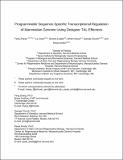| dc.contributor.author | Zhang, Feng | |
| dc.contributor.author | Cong, Le | |
| dc.contributor.author | Lodato, Simona | |
| dc.contributor.author | Kosuri, Sriram | |
| dc.contributor.author | Church, George M. | |
| dc.contributor.author | Arlotta, Paola | |
| dc.date.accessioned | 2013-01-31T20:29:39Z | |
| dc.date.available | 2013-01-31T20:29:39Z | |
| dc.date.issued | 2011-01 | |
| dc.date.submitted | 2010-11 | |
| dc.identifier.issn | 1087-0156 | |
| dc.identifier.issn | 1546-1696 | |
| dc.identifier.uri | http://hdl.handle.net/1721.1/76706 | |
| dc.description.abstract | The ability to direct functional proteins to specific DNA sequences is a long-sought goal in the study and engineering of biological processes. Transcription activator–like effectors (TALEs) from Xanthomonas sp. are site-specific DNA-binding proteins that can be readily designed to target new sequences. Because TALEs contain a large number of repeat domains, it can be difficult to synthesize new variants. Here we describe a method that overcomes this problem. We leverage codon degeneracy and type IIs restriction enzymes to generate orthogonal ligation linkers between individual repeat monomers, thus allowing full-length, customized, repeat domains to be constructed by hierarchical ligation. We synthesized 17 TALEs that are customized to recognize specific DNA-binding sites, and demonstrate that they can specifically modulate transcription of endogenous genes (SOX2 and KLF4) in human cells. | en_US |
| dc.description.sponsorship | Harvard University. Society of Fellows | en_US |
| dc.description.sponsorship | National Human Genome Research Institute (U.S.) (Center for Excellence in Genomics Science P50 HG003170) | en_US |
| dc.description.sponsorship | United States. Dept. of Energy (Genomes to Life DE-FG02-02ER63445) | en_US |
| dc.description.sponsorship | United States. Defense Advanced Research Projects Agency (W911NF-08-1-0254, G.M.C.) | en_US |
| dc.description.sponsorship | Wyss Institute of Biologically Inspired Engineering | en_US |
| dc.description.sponsorship | National Institutes of Health (U.S.) (Transformative R01 (R01 NS073124-01)) | en_US |
| dc.description.sponsorship | European School of Molecular Medicine (predoctoral fellowship) | en_US |
| dc.language.iso | en_US | |
| dc.publisher | Nature Publishing Group | en_US |
| dc.relation.isversionof | http://dx.doi.org/10.1038/nbt.1775 | en_US |
| dc.rights | Creative Commons Attribution-Noncommercial-Share Alike 3.0 | en_US |
| dc.rights.uri | http://creativecommons.org/licenses/by-nc-sa/3.0/ | en_US |
| dc.source | Zhang via Courtney Crummett | en_US |
| dc.title | Programmable Sequence-Specific Transcriptional Regulation of Mammalian Genome Using Designer TAL Effectors | en_US |
| dc.type | Article | en_US |
| dc.identifier.citation | Zhang, Feng et al. “Efficient Construction of Sequence-specific TAL Effectors for Modulating Mammalian Transcription.” Nature Biotechnology 29.2 (2011): 149–153. Web. | en_US |
| dc.contributor.department | Massachusetts Institute of Technology. Department of Brain and Cognitive Sciences | en_US |
| dc.contributor.approver | Zhang, Feng | |
| dc.contributor.mitauthor | Zhang, Feng | |
| dc.relation.journal | Nature Biotechnology | en_US |
| dc.eprint.version | Author's final manuscript | en_US |
| dc.type.uri | http://purl.org/eprint/type/JournalArticle | en_US |
| eprint.status | http://purl.org/eprint/status/PeerReviewed | en_US |
| dspace.orderedauthors | Zhang, Feng; Cong, Le; Lodato, Simona; Kosuri, Sriram; Church, George M; Arlotta, Paola | en |
| dc.identifier.orcid | https://orcid.org/0000-0003-2782-2509 | |
| mit.license | OPEN_ACCESS_POLICY | en_US |
| mit.metadata.status | Complete | |
